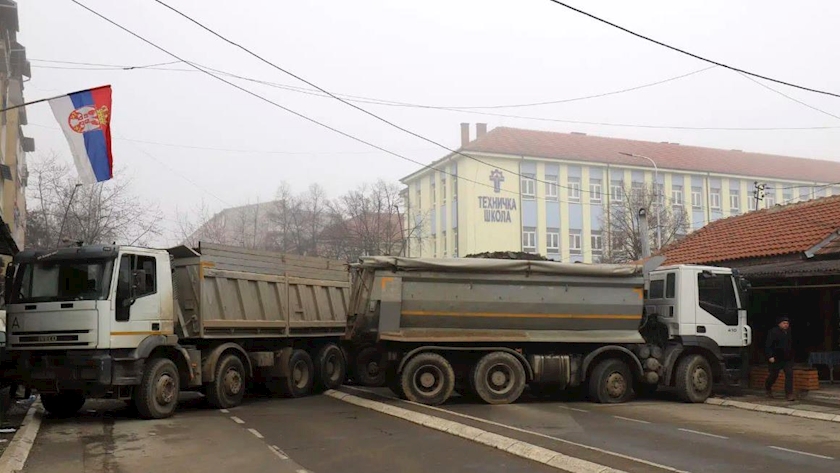Iran Press/ Europe: The new barriers, made of heavily loaded trucks, were put up overnight in Mitrovica, a northern Kosovo town divided between Kosovo Serbs and ethnic Albanians, who represent the majority in Kosovo as a whole.
Serbia placed its troops on the border with Kosovo in a full state of combat readiness after NATO calls for de-escalating tensions between the two wartime Balkan foes; meanwhile, Kosovar said Serbia, under the influence of Russia, was aiming to destabilize Kosovo.
Serbia on Monday placed its security troops on the border with Kosovo in the entire state of combat readiness and Tuesday erected more roadblocks in northern Kosovo and defied international demands to remove those placed earlier.
Kosovar Interior Minister Xhelal Svecla has said Serbia, under the influence of Russia, was aiming to destabilize Kosovo by supporting the ethnic Serb minority in the north who have been blocking roads and protesting for almost three weeks in the Balkan country.

Serbs in the ethnically divided city of Mitrovica in northern Kosovo erected new barricades on Tuesday, hours after Serbia said it had put its army on the highest combat alert following weeks of escalating tensions between Belgrade and Pristina.
"It is precisely Serbia, influenced by Russia, that has raised a state of military readiness and that is ordering the erection of new barricades, in order to justify and protect the criminal groups that terrorise... citizens of Serb ethnicity living in Kosovo," Svecla said in a statement on Tuesday.
The new barriers, made of heavily loaded trucks, were put up overnight in Mitrovica, a northern Kosovo town divided between Kosovo Serbs and ethnic Albanians, representing the majority in Kosovo.
It was the first time since the recent crisis started that Serbs have blocked streets in one of the main towns. Until now, barricades had been set on roads leading to the Kosovo-Serbia border.
Serbia denies trying to destabilize its neighbor and wants to protect the minority there.
In 2008, Kosovo declared its independence from Serbia. Belgrade has never accepted this move, and tensions between the two countries keep simmering.
Kosovo has asked NATO-led peacekeepers stationed there to remove the barriers and hinted that Pristina's forces would do it if the KFOR force didn't' react.
About 4,000 NATO-led peacekeepers have been stationed in Kosovo since the 1999 war, which ended with Belgrade losing control over the territory.
Any Serbian armed intervention in Kosovo would likely result in a clash with NATO forces and would mean a significant escalation of tensions in the Balkans, which are still reeling from the bloody breakup of Yugoslavia in the 1990s.
Tensions between Kosovo, which declared independence after a war in 2008, and Serbia have peaked over the past month. Western attempts to reach a negotiated settlement have failed, with Serbia refusing to recognize Kosovo's statehood.
KFOR and the EU have asked Pristina and Belgrade to restrain and avoid provocations.
Approximately 50,000 Serbs live in the northern part of Kosovo and refuse to recognize the Pristina government or Kosovo as an independent state. They see Belgrade as their capital and want to keep their Serbian license plates.
205
Read More:
Serbian troops on Kosovo border in state of combat readiness
Hossein Vaez

